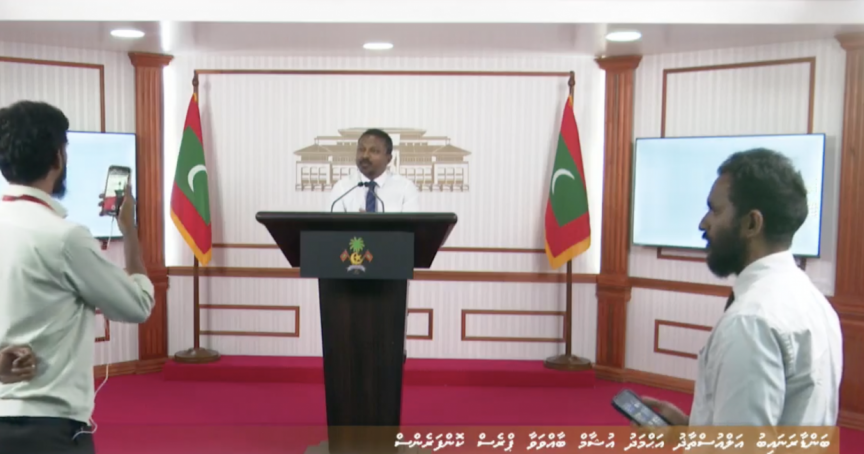
Screenshot of video footage from the press conference held by Attorney General Ahmed Usham on August 28, 2025: Press boycotted the conference.
Journalists walked out of a press conference held at the President's Office on Thursday, accusing Attorney General Ahmed Usham of misrepresenting facts regarding the controversial media bill. The bill seeks to curtail press freedom and give the government authority over the media.
Usham claimed the media bill, introduced to parliament by government-affiliated Thulhaadhoo Independent MP Abdul Hannan Abubakr, was drafted in consultation with journalists. However, journalists present at the conference denied this, stating the AG was falsifying information and attempting to confuse them.
Usham further stated that a draft bill sent to the AG’s Office in August 2022 by the Media Council had "not too much of a difference" from the current bill accepted in parliament. Journalists, however, maintained they were unaware of such a draft or its contents.
It is notable that President Dr. Mohamed Muizzu also met with the press on Thursday. The President’s Office reported on the meeting, stating the government is '100 percent pro-media' and will propose amendments to certain articles in the bill.
Earlier on Thursday morning, Minister of Youth Empowerment, Information and Arts Ibrahim Waheed (Asward) and Minister at the President's Office for Strategic Communications Ibrahim Khaleel met with the protesting journalists at the Presidential Office. During this meeting, journalists requested the opportunity to submit their complaints directly to the President.
Establishment of a Maldives Media and Broadcasting Commission. This new commission would oversee media operations.
Three members would be appointed by the President, with the remaining four elected by the media.
The President would appoint the commission's head.
A fine of MVR 5,000 to MVR 25,000 would be imposed for failure to rectify issues as per the commission’s order.
Media outlets could face fines up to MVR 100,000 for actions deemed illegal or against amended laws.
The commission would have the power to temporarily cancel a media outlet's registration upon commencing an investigation.
The commission could annul a registered media outlet before court proceedings are concluded.
The commission would have the authority to block news websites, tabloid channels, and stop TV broadcasts.
The commission could bring back cases from up to a year before its establishment and take action on them.
The President has previously stated he has no interest in controlling the media and has asked PNC members to pass the bill without giving him any powers, as the bill currently implies.